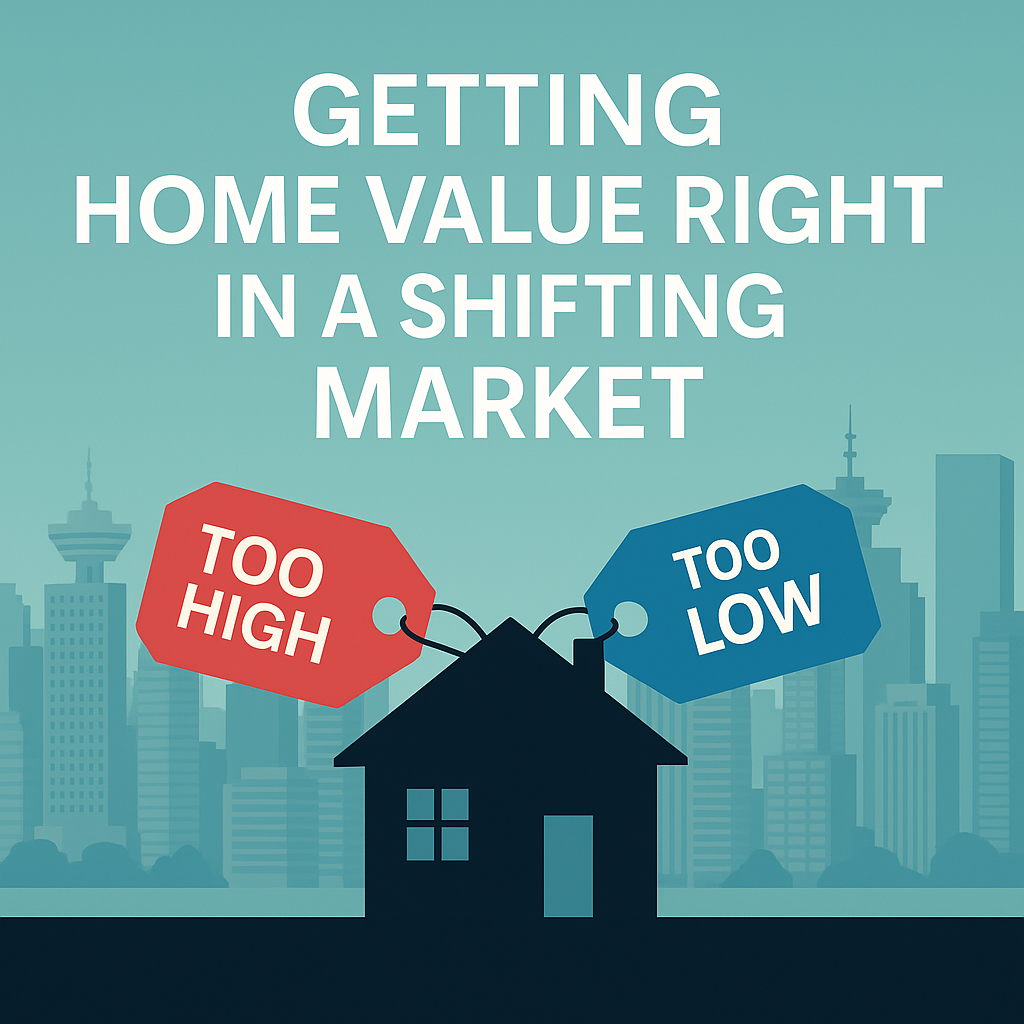
Learn how Vancouver sellers can evaluate their home without over-relying on comps. Smart pricing strategies help you win in today’s shifting market.
Selling a home in Vancouver is no longer about picking a number based on what your neighbour sold for last year. In today’s shifting market—where prices, demand, interest rates and government policies can change monthly—home evaluations need a smarter, more strategic approach.
Whether you’re moving up or downsizing, understanding your home’s value requires more than past comps or BC Assessment.
The goal isn’t to “test” the market; it’s to win it.
Why BC Assessment and Past Comps Don’t Tell the Whole Story
BC Assessment Is Outdated Before It Arrives
BC Assessment is conducted once a year (as of July) and mailed to homeowners the following January. No one comes to your property to inspect upgrades, renovations, or unique features. By the time it reaches you, Vancouver’s market may already look completely different.
Comps as a Starting Point—Not the Finish Line
Comparables (or “comps”) are useful, but relying too heavily on them misses the nuance:
A sale from 3+ months ago may already be outdated.
Even “similar” homes differ in upgrades, lot, view, and curb appeal.
Comps don’t account for buyer psychology or urgency. Like an iceberg, only see the sold price but, underwater there is unknown motivation and/or details of the sale.
Bottom line: Comps are a tool, not the answer.
The Pitfalls of Online Evaluations
Many online evaluation tools promise quick answers by algorithms . But be cautious: these automated results are “as good as sushi from a gas station.” They may give you a rough ballpark, but they lack the context of upgrades, street-by-street variations, and shifting buyer sentiment.
If you want extra validation, hiring a professional property assessor $ company can provide another reference point to balance against your agent’s evaluation.
Understanding Market Metrics
HPI (Home Price Index)
HPI tracks typical home price movements since your purchase date, giving a sense of long-term equity growth. But it doesn’t factor in your property’s unique features or local micro-market shifts.
Average vs. Median Price
Average price is easily skewed by luxury sales.
Median price shows the middle ground and often better reflects what most buyers are paying at the Macro level.
In August 2025, the Metro Vancouver composite benchmark price was ~$1,150,400, down 3.8% year-over-year, while the average sale price was ~$1,226,351—showing how luxury deals inflate the averages.
Pricing: It’s About Strategy, Not Science
Align Pricing With Your Why
The right pricing strategy depends on your goals. Downsizing? Certainty and speed may matter most. Upsizing? You may want to maximize return. Either way, pricing isn’t about picking one “right number”—it’s about creating a strategy and a plan.
Why “Room to Negotiate” Backfires
Listing higher to leave wiggle room can actually hurt you. Buyers in Vancouver search in $50,000 increments. Price just $10,000 above a threshold, and you could miss an entire pool of qualified buyers. Meanwhile, serious buyers will stretch if they see real value.
Pricing Too High Only Helps the Competition
Overpricing doesn’t just hurt your sale—it helps your neighbour’s home look like a better deal.
Staging, Improvements, and Timing
A strong asking price is supported by presentation. Home improvements and professional staging can make buyers willing to pay more. This is why the selling process should start 3–5 months before going live on MLS:
Time to complete smart renovations or touch-ups.
Time to stage and photograph the home properly.
Time to evaluate your options calmly, without rushing.
Your real estate advisor should guide you through which upgrades add value and which to skip.
Case Study: 3518 W 23rd Avenue, Dunbar
Instead of overpricing, the strategy was to price in line with the market, highlighting upgrades and staging that supported value.
Listed: $2,699,000
Sold: 99% of asking price
Days on Market: 10
Over 20,000 online views
Record price of $997 per sq.ft. in the area
This result wasn’t luck—it was strategy. By pricing realistically and presenting the home well, the seller avoided reductions, attracted strong interest, and walked away satisfied.
Why Your Choice of Advisor Matters ?
True apples-to-apples comparables: Adjusted for condition, lot size, and renovations.
Market context, not just comps: Integrating benchmark, median, and buyer psychology.
Strategic timing: Planning 3–5 months in advance to position the property.
Honest advice: Avoiding inflated pricing just to “win” the listing.
Credibility protection: Preventing repeated reductions that weaken your market position.
Conclusion
In Vancouver’s shifting market, home evaluations must go beyond past comps or BC Assessment. The smartest strategies combine fresh market data, realistic pricing, proper staging, and a clear alignment with your goals.
The goal isn’t to test the market—it’s to win it.
Thinking about selling in the next 3–6 months? Let’s build a tailored pricing and staging plan today so you’re ready to capture the market tomorrow. Contact me for no obligation meeting.
